Manchester Jazz Festival travels the spaceways with Thomas De Pourquery’s Supersonic, plus electrifying sounds from Tim Garland and Michelson Morley
Monday, August 8, 2016
‘Rethink Jazz’.
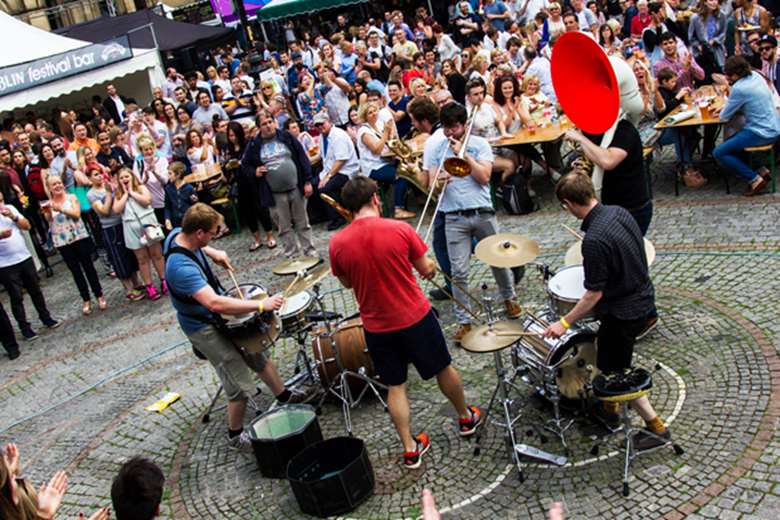
That was the slogan of this year’s Manchester Jazz Festival. It was over town, on badges and billboards, backed up by lists of subgenres that included soul, funk, brass, chill and – in extra big letters – hip hop. Together with £5 tickets and the location of the festival’s main hub, an encampment of marquees with prominently placed bar slap bang in the middle of Albert Square, they were purpose built to lure passersby.
Last year’s 20th anniversary was all about bands from the North West and support for the local scene. It won the festival an award for adventurous programming (announced late last month) from the Europe Jazz Network and there was more of the same this year. MJF 21 seemed as much about bringing the music to new audiences though: selling jazz to the city, while maintaining that adventurous reputation.
The premiere of New Seeing,a festival commission for Ben Cottrell, leader of Manchester big band Beats and Pieces, at the Royal Northern College of Music (RNCM) on Wednesday night, got a thumbs up from Jazzwise editor Mike Flynn (full review here). A double rhythm section and 12 strings combined with the lead voice of Graham South’s flugelhorn to create a thrusting cinematic sound, all varicoloured layers and pulsating polyrhythms, that cemented Cottrell’s reputation as a composer of depth and experience.
The opening weekend was equally successful. Solstice, led by MJF regular Tori Freestone on tenor, provided a gentle start to Saturday, with a set of Kenny Wheeler-esque originals, featuring Brigitte Beraha’s ethereal vocals, harmonic shivers from pianist John Turville and gutsy solos from Freestone herself.
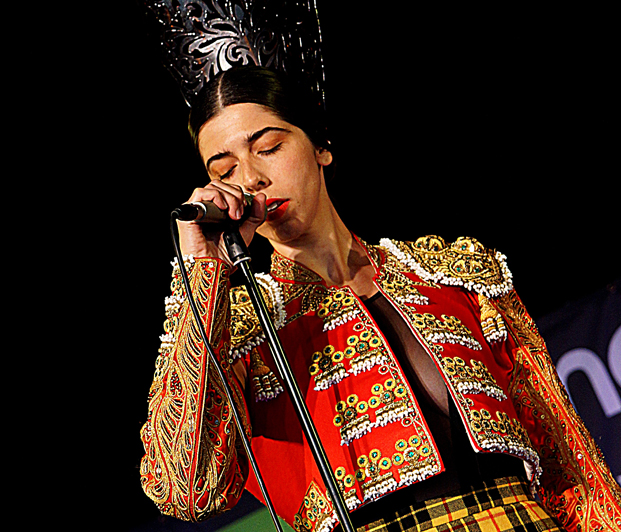
“I usually take my skirt off but it’s 3pm,” announced Julia de Castro (above), having already removed a sequinned bullfighter's jacket, so proving that jazz stretches to just about anything these days. That includes Cuplé, an early 20th century Spanish style similar to cabaret, which madrileño jazz quartet De La Puríssima are busy updating with songs about open relationships and the prowess of men from Cordoba. De Castro’s vocals were a little shaky, but she played the part of flirtatious front woman well, the band were solid and the set was a hit with the crowd.
More popular still were funky New Orleans-style brass outfit the Young Pilgrims (pictured top) whose flash mob appearances on the square outside in between gigs were a riot of street beats, blarty riffs and unison shouts, anchored by the bellowing of a hot orange sousaphone.
An appearance from Bristol-based guitar, drums and sax trio Michelson Morley stood out for the imaginative use of electronics. Pulsing, minimalist originals swam through a broth of sci-fi effects: saxophone shrieks like lightsaber slashes and loops that sounded like alarm calls.
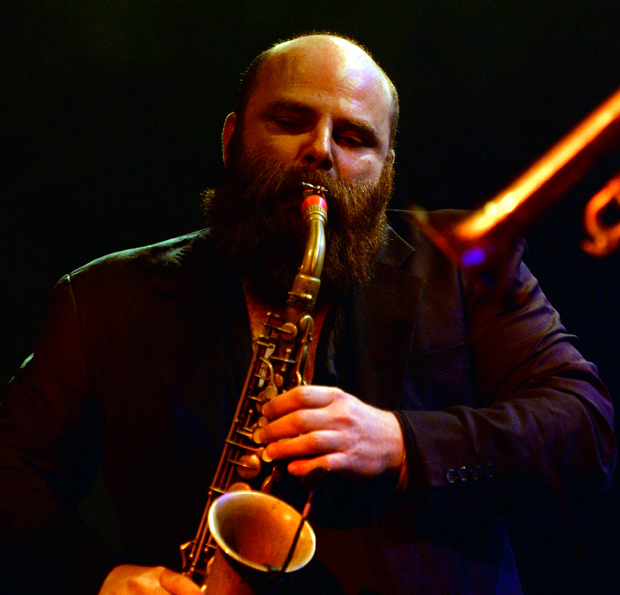
And then there was Parisian altoist Thomas de Pourquery (above) and his Sun Ra project, Supersonic (below), who headlined on Saturday and pretty much blew everything else out of the water. Their gig, at the RNCM, was total madness: an absurd and absurdly brilliant mashup of jazz, blues, grunge, kitsch electronica and slapstick comedy – like watching a collaboration session between Laurel and Hardy, Weezer and an early naughties Casio keyboard demo, or catching a pared-down Arkestra playing an after hours jam at Philippe Gaulier’s clown school.
They stormed through arrangements of ‘Rocket Number Nine’, ‘Love In Outer Space’, ‘Space Is The Place’ and ‘Watusi Egyptian March’ and it was glorious – right up there with the best gigs I’ve seen this year. Frederick Galiay played his bass with a guitar slide and what looked like a plectrum, which gave his sound stacks of slack, buzzing top end. Bari-player Laurent Bardainne and trumpeter Aymeric Avice gave us some cosmic solos and De Pourquery’s excellent, shockingly sweet falsetto vocals cut through all the distorted electro-gunk like Fairy liquid.
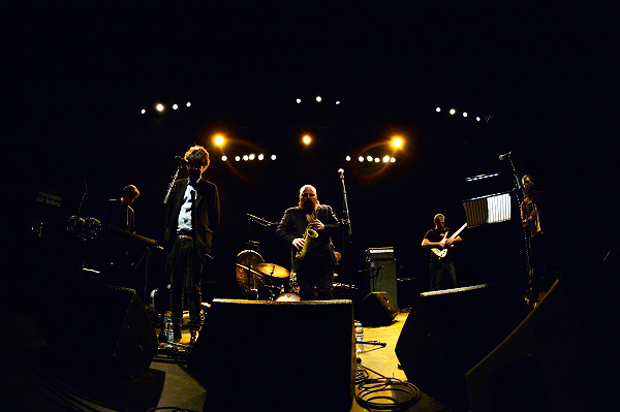
The key partnership in the band is between De Pourquery, the swaggering frontman, and lunatic drummer Edward Perraud, who played his stop-start grooves with all the frenetic energy of a clockwork monkey; bounced drums sticks off his tom toms, high into the air; created the richest bowed cymbal sounds I’ve ever heard, with a Frankensteinish homemade bow; and fooled around with an enormous gong. The best moment of all came at the end of a big drum feature, when he paused, stood up for a monster double-handed hit, staggered a little and had the solo finished for him by a single piano chord from Arnaud Roulin. Blissful comic timing. This was the band’s first appearance in the UK. I hope to God (or perhaps that should be Ra) that it won’t be their last.
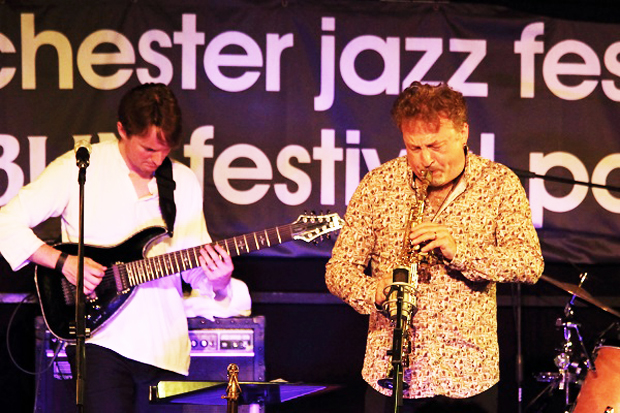
MJF 21 wasn’t all about newcomers and rarities. There were old favourites too, as there should be. The music world’s festishisation of all things sparkly and new can make it easy for stalwarts like Tim Garland (above) to drop off your list, which would be a shame. He’s a superb musician and a set from his Electric Quartet, comprising guitarist Ant Law (above), keys-player Jason Rebello and percussionist Asaf Sirkis, was excellent. The tunes, many of them taken from latest album One, were punchy, blending jazz rock fusion with nods to India and the Middle East. Among the highlights were ‘Sama'i For Peace’, a funky reworking of a ten beat Middle Eastern rhythm, and ‘Prototype’, the heavy Brecker Brothers-style finisher.
It was really all about the improvising prowess of the band though: 12-string guitar riffs that fluttered like clouds of silver butterflies; Rebello’s corkscrewing lines on piano and Nord; drum breakdowns from Sirkis underscored by the warped woomf woomf of the udu, a clay pot percussion instrument used by the Igbo people of southern Nigeria; and snare drum brush-work that sounded like the scrabbling of a trapped bird (very much in a good way). Garland played soprano, tenor and, best of all, bass clarinet, which recalled a sitar and then an accordion, on an engrossing introduction to Chick Corea’s ‘Windows’, enhanced by delay and chorus effects.
I’m not sure whether MJF are rethinking jazz or just thinking about it very carefully indeed. Either way they’re doing an outstanding job. The crowd on Albert Square was more varied than your typical jazz festival crowd and even though a fair chunk never made it beyond the bar, the street food stalls and the free sets outside, that’s a step in the right direction. MJF wants to be a festival for the whole of Manchester, not just a hardcore jazz clique, which is admirable. There’s something here for musos of all tastes. The subgenres emblazoned on those posters were just the tip of the iceberg.
– Thomas Rees
– Photos: Thomas de Pourquery band – Daniel Porter-Jones / Young Pilgrims and De la Purissima– Phil King / Tim Garland – Suchitra Hegde